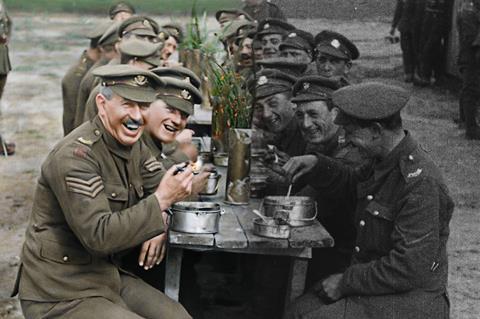Peter Jackson has remembered them

Dir. Peter Jackson. UK/NZ. 2018. 99 mins.
After all, and despite almost a million deaths, it wasn’t the war to end all wars. The memory of their great sacrifice, their joyful rush to slaughter, has dimmed. Which perhaps makes Peter Jackson’s evocation of the Western Front in this documentary commissioned to mark the centenary of the Armistice all the more devastating. Veteran’s voices, still bravely chipper, remember their service, as Jackson’s Weta colourises and at times re-animates the ghostly frames of doomed troops going over the top, occasionally giving them a shard of voice.
Jackson does not introduce colourisation until the troops arrive at the Western Front, a good half-hour into his film
Jackson’s film is more than a technical tribute: it’s a testament to the bravery and camaraderie of the soldiers, the memory of which has faded like the photographs he brings back to life. In a way, it helps arrest the fear that we are forgetting this futile obliteration of an entire generation.
Tellingly, the 3D They Shall Not Grow Old carries a 15 certificate for release in the UK, older than some of the boys who enlisted when the First World War was declared in August 1914. This film is deeply unsettling, not just for the vivid views and sounds of life as it was in the trenches, but for the stoic voices that accompany it, remembering how their comrades ran to meet their certain deaths.
As such, it seems perfect that a copy of They Shall Not Grow Old will be sent to all secondary schools in the UK after a world premiere at the London Film Festival on October 16 (it will also be shown nationwide on that day, through Trafalgar Releasing). International sales rights have yet to be finalised for this documentary commissioned by London’s Imperial War Museum with 14-18 NOW, the UK’s arts programme to celebrate the centenary. All those in possession of those handed-down, faded sepia pictures will want to see this: the voices (recorded by the IWM, which also provided the footage), come from global veterans, encompassing all ranks and classes of soldier.
Jackson and editor Jabez Olsson tackle the footage in strict chronological order: he does not introduce colourisation until the troops arrive at the front. Voices, surprisingly cheerful, recall the exuberance of enlisting, the tricks used to send underage boys off to the front. “We were,” says one, “the refuse of our industrial system”. Many of those who signed up were poorly nourished, as evidenced by uniformly bad teeth, and minimally educated, unable to vote. We made the best of it, say the survivors, one going so far as to note that “I wouldn’t have missed it.”
Footage from training camp is followed by the gruelling march to the front, carrying a regulation 109lbs of kit and no spare clothes. As all hell starts to break loose, Jackson unleashes his colour, adding sparse dialogue to sequences which disintegrate into privation, destruction, and mass death. Yet all the time the voices recorded years after the war ended are still accepting of their lot. It’s that bravery in the face of what Jackson makes terrifyingly real that is so upsetting. The director, who dedicates this film to his grandfather, takes away the luxury of the words “unimaginable horror” from those generations who survived.
As to be expected, but not taken for granted, Weta’s technical contribution is immaculate. There’s something about the colours that come alive, yet they are are definably of the time – a crafted palette. The soundtrack would stand independently of visual footage. Sometimes, in the 3D restoration, the edges of some of the soldiers seem to fade in and out of the flickering footage like the ghosts they now are. And we will, after all, continue to remember them.
Production company: Wingnut Films
UK distribution: Trafalgar Releasing
Producers: Clare Olssen, Peter Jackson
Editor: Jabez Olsson
Music: Plan 9
























